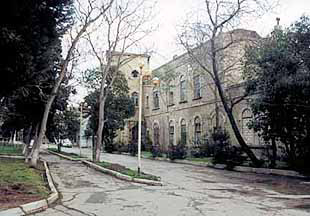|

Autumn 2001 (9.3)
Page
11
Newsmakers
Nobel
Prize Centennial
  This year marks the
100th anniversary of the first Nobel Prizes, which were awarded
in 1901 in Stockholm and Oslo. While this prestigious honor is
known worldwide, few people realize that roughly 10 percent of
the Nobel Prize money stems from the oil-producing company that
the Nobel brothers once ran in Baku. This year marks the
100th anniversary of the first Nobel Prizes, which were awarded
in 1901 in Stockholm and Oslo. While this prestigious honor is
known worldwide, few people realize that roughly 10 percent of
the Nobel Prize money stems from the oil-producing company that
the Nobel brothers once ran in Baku.
When the Russian government allowed a free competition for plots
in Azerbaijan in 1873, Robert Nobel, a chemist with experience
selling American petroleum products, saw an opportunity. He and
his brothers, Ludvig and Alfred, kept up with developments around
the world, and they knew about American oil in Pennsylvania.
Ludvig invented a sophisticated refinery that was years ahead
of the American companies.
Above:
These days
the residence of the Nobel Brothers in Baku's "Black City"
is vacant and derelict. Profit from Baku's oil was a major part
of the principle that Alfred Nobel (below) used to establish the world-famous
Nobel Prize 100 years ago.
  In 1879, a shareholding
company was instituted. The main owners were the Nobel Brothers.
Alfred was involved in Azerbaijan for 16 years, consulting with
his brothers by mail on financial, chemical and technical solutions
for the company. Their oil products were distributed all over
Russia, into Central Asia and in Europe. The majority of technically
skilled personnel for the oil wells came from Finland, Sweden,
Norway and Germany. Together they formed a colony at the Villa
Petrolea in the "Black City" region of Baku. In 1879, a shareholding
company was instituted. The main owners were the Nobel Brothers.
Alfred was involved in Azerbaijan for 16 years, consulting with
his brothers by mail on financial, chemical and technical solutions
for the company. Their oil products were distributed all over
Russia, into Central Asia and in Europe. The majority of technically
skilled personnel for the oil wells came from Finland, Sweden,
Norway and Germany. Together they formed a colony at the Villa
Petrolea in the "Black City" region of Baku.
However, at the turn of the century, unrest among unskilled and
poor workers took a difficult turn with political strikes, thefts,
robberies and murders. Russia was in turmoil over the incompetence
of the tsar, the influence of Rasputin on the government and
general conservatism. The war with Japan also had a devastating
effect. In 1907, a number of Swedes employed by Nobel were murdered.
Ethnic conflicts spread violence throughout the Caucasus.
During World War I, a weak Russia joined the Slavs in Southern
Europe, breaking ground for the revolution in 1917. In 1918,
most foreigners left Russia in a hurry. The Nobel family returned
safely to Stockholm. They lost everything during the Revolution
to the new regime in Moscow and, as they had no more oil for
their European partners, they went ahead and sold the companies
that they still owned in Europe.
The depression in 1929 affected the Nobels, but they had savings
in Stockholm. Half of the Nobel oil companies' shares were sold
to Standard Oil of New Jersey to secure the family's economic
future. The Nobels believed strongly that the Revolution would
collapse soon and that Russia would return to the way it had
been. But as we now know, that never happened.
A new book, "Ludvig Nobel: Petroleum Has a Shining Future,"
by Brita Asbrink describing the Nobel family's involvement in
oil, will be published in Sweden in October 2001. She is also
producing a TV documentary on the same subject to be aired in
November on Swedish TV.
____
From Azerbaijan
International
(9.3) Autumn 2001.
© Azerbaijan International 2001. All rights reserved.
Back to Index
AI 9.3 (Autumn 2001)
AI Home
| Magazine
Choice
| Topics
| AI Store | Contact us
Other Web sites
created by Azerbaijan International
AZgallery.org | AZERI.org | HAJIBEYOV.com
|